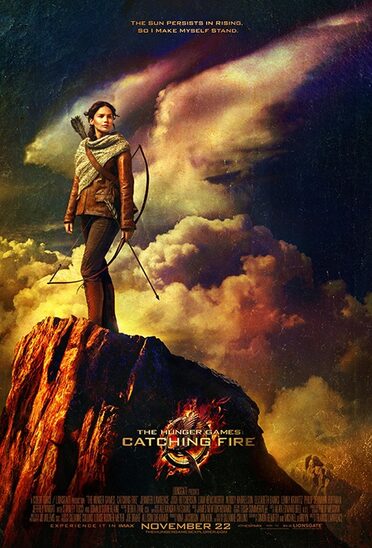
by Dave "The Conduit" Davis
The difference between a symbol and a hero is that a symbol isn’t real — its value is solely made up by what those who believe in it impart to it. A hero is a person who does the right thing at the right time.
In The Hunger Games: Catching Fire, Katniss Everdeen (Jennifer Lawrence) is neither of those things, and that is one of the film's biggest strengths. She is a survivor, pushed into a bigger world than she ever wanted to see. If left to her own devices, she would have run away with family and friends, but she is quickly stripped of those choices and is forced to make more desperate choices of her own. We all like to think we have it in us to be a great hero, but the reality is that being a survivor comes much more naturally, and is a relatable to an audience in a way that marble statues never are.
In the sequel to 2012’s The Hunger Games, we’re again shown the bleak world of Panem, which is built on the bones of the United States after a civilization-ending war. The nation is split into 12 districts (well, 13, actually, but something awful erased one district from the culture). Each district is subservient to The Capitol and each year, as penance for an uprising decades earlier, sends a young man and woman to compete to the death in what’s known as The Hunger Games. The winners are kept in comparative luxury for the rest of their lives, the populace is kept in line, and the games serve as a safety valve to keep the public’s attention focused on something other than the abuses of their totalitarian government.
After (spoiler!) winning last year’s Games, Katniss and her fellow District 12 “tribute,” Peeta (Josh Hutcherson) are sent on the traditional “victory tour” of the districts. She doesn’t want to go; she wants to be left alone, but she’s quickly told that it’s not her decision to make; her mother and sister will pay a price if she doesn’t support the government’s line.
The government is already not happy with her. By maneuvering events so that both she and Peeta survived — something that hadn’t happened in the 74-year history of the Games — Katniss managed to not only embarrass the Capitol, but provided something dangerous to the populace: hope. In showing that the government could be beaten in something — anything — mummers of rebellion have started to form, and Katniss, even though she shuns the role, has become their symbol.
While President Snow (Donald Sutherland) would love nothing more than to make her “disappear” with extreme prejudice, he knows that killing her would make Katniss a martyr. So, while the government starts to crack down on the districts, a plan is formed to deal with Katniss publicly by forcing the survivors of previous Games to fight to the death in the 75th edition. 
"We don't have to destroy her, just her image,” says Plutarch Heavensbee (Phillip Seymour Hoffman), the Game master. “Show them that she's one of us now. Let them rally behind that. They're gonna hate her so much they just might kill her for you."
The film, based on the second book of the Hunger Games trilogy by Suzanne Collins, is one of the most satisfying films of 2013. In a year where larger-than-life heroes have dominated the fight of good vs. evil in CGI-slug fests, it’s wonderful to see a more relatable, flawed, vulnerable character do the best she can with what she’s got. Lawrence sells the emotion of her situation, and the surrounding characters, especially her coach, Haymitch (Woody Harrelson) provide color to this world.
One of the strengths of the film is the way the world of Panem is presented. There’s no “exposition bombs” dropped – the audience is given just enough information to know the history and the rules of the film’s world. It’s a great example of the old writing rule of “showing, not telling.” Director Francis Lawrence picks up where The Hunger Games director Gary Ross left off, by giving the audience a glimpse into the larger world as Katniss herself is exposed to it. The world of this film builds upon the strong foundations of the previous one, and while it isn’t as fresh as it was in the previous film, that’s unavoidable — like Katniss, this isn’t the first time we’ve seen the Games, but the stakes are rising higher and higher.
This film is one of the rare cases of the sequel improving on what came before, especially when you consider what came before was an outstanding film in its own right. This is truly accomplished storytelling.
The only drawback to the film is that it ends on a strong “And then what happens?” note — the last 30 seconds is wordless and remarkable. If The Empire Strikes Back taught us anything, though, it’s that building momentum is the job of a middle film, and this one does an outstanding job with it.

(For more from Dave and the great podcast he co-hosts, go to: http://toweroftechnobabble.com/ )
![]()

